|
|
|
Sort Order |
|
|
|
Items / Page
|
|
|
|
|
|
|
| Srl | Item |
| 1 |
ID:
017942
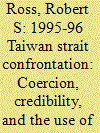

|
|
|
|
|
| Publication |
Fall 2000.
|
| Description |
87-123
|
|
|
|
|
|
|
|
|
|
|
|
|
|
|
|
| 2 |
ID:
111887


|
|
|
|
|
| Publication |
Norway, Norwegian Institute for Defence Studies (IFS), 2012.
|
| Description |
79p.
|
|
|
|
|
|
|
|
|
|
|
|
Copies: C:1/I:0,R:0,Q:0
Circulation
| Accession# | Call# | Current Location | Status | Policy | Location |
| 056491 | 359.03/BEK 056491 | Main | On Shelf | General | |
|
|
|
|
| 3 |
ID:
065466
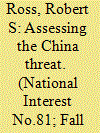

|
|
|
| 4 |
ID:
076993
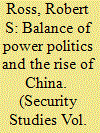

|
|
|
|
|
| Publication |
2006.
|
| Summary/Abstract |
Realists agree that great powers balance the military power of rising powers, but there is little agreement regarding secondary-state responses to rising powers. First, there are differences regarding whether secondary states balance or accommodate rising powers. Second, there are differences among realists regarding the distinct roles of economic and military factors in secondary-state alignment policies. Third, some scholars argue that state alignments are not necessarily determined by realist variables, but can reflect preferences shaped by intentions, historical experiences, or cultural influences. This paper addresses these issues in balance-of-power theory. Its empirical focus is the impact of the rise of China on secondary-state alignments in East Asia. After examining the complex mix of China's military and economic reach in East Asia, it concludes that secondary-state behavior is sensitive to local variation in the great power capabilities and that secondary states tend to accommodate rather than balance rising powers. It further concludes that economic capabilities alone are insufficient to generate accommodation, so that the political-economy literature should reexamine cases of apparent secondary-state accommodation to economic dependency, sensitive to the presence of military vulnerability on the part these secondary states to proximate great powers. These conclusions suggest that there is nothing sui generis or culturally-determined in East Asian international politics and that realism can explain alignment behavior among East Asian states as well as it does among European states. Research on East Asia's response to China's rise that is sensitive to intra-regional variations in U.S. and Chinese military and economic capabilities also challenges assumptions of an emerging Chinese regional hegemony or of a costly region-wide U.S.-China competition.
|
|
|
|
|
|
|
|
|
|
|
|
|
|
|
|
| 5 |
ID:
181692
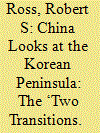

|
|
|
|
|
| Summary/Abstract |
There are two power transitions under way on the Korean Peninsula. Firstly, there is a US–China power transition, reflecting China’s emergence as an economic and military power in Northeast Asia. This is challenging US regional dominance. The second transition reflects South Korea’s development of an independent defence capability against North Korea. A consensus has emerged among Chinese scholars and analysts in government think tanks that these two trends have encouraged South Korea to place itself at greater distance from the United States and China, and to pursue an independent policy toward North Korea that supports Chinese policy preferences. Chinese understanding of the dual power transition is reflected in Beijing’s policies toward South Korea, North Korea and denuclearisation. China no longer contributes to North Korea’s diplomatic isolation or to sanctions regimes against it, with implications for US policy.
|
|
|
|
|
|
|
|
|
|
|
|
|
|
|
|
| 6 |
ID:
005512
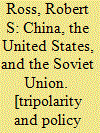

|
|
|
|
|
| Publication |
New York, M E Sharpe, 1993.
|
| Description |
xv,204p.
|
| Standard Number |
1563242532
|
|
|
|
|
|
|
|
|
|
|
|
Copies: C:1/I:0,R:0,Q:0
Circulation
| Accession# | Call# | Current Location | Status | Policy | Location |
| 036814 | 327.51073/ROS 036814 | Main | On Shelf | General | |
|
|
|
|
| 7 |
ID:
091423
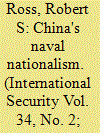

|
|
|
|
|
| Publication |
2009.
|
| Summary/Abstract |
Recent developments in Chinese politics and defense policy indicate that China will soon embark on an ambitious maritime policy that will include construction of a power-projection navy centered on an aircraft carrier. But just as nationalism and the pursuit of status encouraged past land powers to seek great power maritime capabilities, widespread nationalism, growing social instability, and the leadership's concern for its political legitimacy drive China's naval ambition. China's maritime power, however, will be limited by the constraints experienced by all land powers: enduring challenges to Chinese territorial security and a corresponding commitment to a large ground force capability will constrain China's naval capabilities and its potential challenge to U.S. maritime security. Nonetheless, China's naval nationalism will challenge U.S.-China cooperation. It will likely elicit increased U.S. naval spending and deployments, as well as politicization of China policy in the United States, challenging the United States to develop policy to manage U.S.-China naval competition to allow for continued political cooperation.
|
|
|
|
|
|
|
|
|
|
|
|
|
|
|
|
| 8 |
ID:
181212
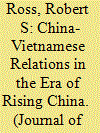

|
|
|
|
|
| Summary/Abstract |
In the twenty-first century, China and Vietnam have experienced heightened conflict over their disputes in the South China Sea. But Chinese policy and the writings of Chinese observers make clear that, for China, this conflict is a struggle between a great power and its smaller neighbor over China’s demand for a sphere of influence on its borders. Since 1949, the People’s Republic of China has consistently maintained that Vietnam reject strategic cooperation with an extra-regional power. For Vietnam, however, China’s looming presence poses an existential threat that drives Vietnamese leaders to seek support from extra-regional powers. Since 2010, China has relied on coercive diplomacy and threats of crisis escalation to constrain Vietnamese reliance on outside powers, especially the United States, to challenge Chinese interests.
|
|
|
|
|
|
|
|
|
|
|
|
|
|
|
|
| 9 |
ID:
110689
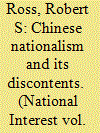

|
|
|
|
|
| Publication |
2011.
|
| Summary/Abstract |
AT NO time since the end of the Cold War have U.S.-China relations been worse. Yes, in the past there have been periodic confrontations over Taiwan, and tensions over the American bombing of the Chinese embassy in Belgrade and the Chinese fighter-jet collision with an American reconnaissance plane over the South China Sea. But the current downturn reflects a potential long-term trend with the likelihood of protracted strategic conflict. Equally troubling, this raising of tensions is not only unnecessary but also potentially costly to the United States.
|
|
|
|
|
|
|
|
|
|
|
|
|
|
|
|
| 10 |
ID:
088559
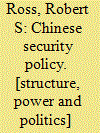

|
|
|
|
|
| Publication |
London, Routledge, 2009.
|
| Description |
331p.
|
| Standard Number |
9780415777858
|
|
|
|
|
|
|
|
|
|
|
|
Copies: C:1/I:0,R:0,Q:0
Circulation
| Accession# | Call# | Current Location | Status | Policy | Location |
| 054228 | 355.033551/ROS 054228 | Main | On Shelf | General | |
|
|
|
|
| 11 |
ID:
052264
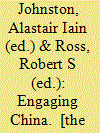

|
|
|
|
|
| Publication |
London, Routledge, 1999.
|
| Description |
xv,309p.
|
| Standard Number |
0415208416
|
|
|
|
|
|
|
|
|
|
|
|
Copies: C:1/I:0,R:0,Q:0
Circulation
| Accession# | Call# | Current Location | Status | Policy | Location |
| 044644 | 327.51/JOH 044644 | Main | On Shelf | General | |
|
|
|
|
| 12 |
ID:
073074
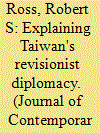

|
|
|
| 13 |
ID:
090185


|
|
|
|
|
| Publication |
2009.
|
| Summary/Abstract |
It is past time for Americans to take seriously the challenge posed by the contining growth of China's military power. Triggered by the geopolitical shifts that accompanied the end of the cold war, fueled by the nation's repid economic growth, and driven by a mix of insecurity and ambition, today's buildup has been under way for the better part of two decades. Even before the collapse of the Soviet Union, Chinese strategists began to shift their attention from preparing for a massive, all-out "People's War against a nuclear-armed northern invader toward what they labeled" local war under high-tech conditions.
|
|
|
|
|
|
|
|
|
|
|
|
|
|
|
|
| 14 |
ID:
027354
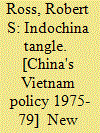

|
|
|
|
|
| Publication |
New York, Columbia University Press, 1988.
|
| Description |
xvi, 361p.
|
| Series |
Study of the East Asian Institute
|
| Standard Number |
0231065647
|
|
|
|
|
|
|
|
|
|
|
|
Copies: C:1/I:0,R:0,Q:0
Circulation
| Accession# | Call# | Current Location | Status | Policy | Location |
| 030376 | 327.510597/ROS 030376 | Main | On Shelf | General | |
|
|
|
|
| 15 |
ID:
071905
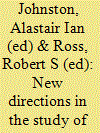

|
|
|
|
|
| Publication |
Stanford, Stanford University Press, 2006.
|
| Description |
xvi, 482p.
|
| Standard Number |
0804753628
|
|
|
|
|
|
|
|
|
|
|
|
Copies: C:1/I:0,R:0,Q:0
Circulation
| Accession# | Call# | Current Location | Status | Policy | Location |
| 051292 | 327.51/JOH 051292 | Main | On Shelf | General | |
|
|
|
|
| 16 |
ID:
068596
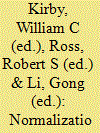

|
|
|
|
|
| Publication |
Cambridge, Harvard University Press, 2005.
|
| Description |
xix, 376p.
|
| Standard Number |
0674019040
|
|
|
|
|
|
|
|
|
|
|
|
Copies: C:1/I:0,R:0,Q:0
Circulation
| Accession# | Call# | Current Location | Status | Policy | Location |
| 051092 | 327.7305109047/KIR 051092 | Main | On Shelf | General | |
|
|
|
|
| 17 |
ID:
116118
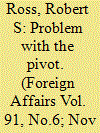

|
|
|
|
|
| Publication |
2012.
|
| Summary/Abstract |
Ever since the Chinese leader Deng Xiaoping opened up his country's economy in the late 1970s, China has managed to grow in power, wealth, and military might while still maintaining cooperative and friendly relations with most of the world. Until a few years ago, that is, when Beijing seemed to change tack, behaving in a way that alienated its neighbors and aroused suspicion abroad. In December 2009, for example, Beijing's resistance to compromise at the UN Climate Change Conference angered European countries and the United States.
|
|
|
|
|
|
|
|
|
|
|
|
|
|
|
|
| 18 |
ID:
101776
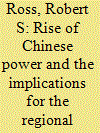

|
|
|
|
|
| Publication |
2010.
|
| Summary/Abstract |
This article examines the reach of China's growing economic and military power in East Asia. It examines the economic and military sources of the rise of China and the implications of the development of Chinese strategic influence on the Korean Peninsula and across the Taiwan Strait. It also considers where in East Asia China has yet to develop greater coercive or deterrent military capabilities, so that the strategic status quo in this area persists, thus establishing the regional strategic boundaries of the rise of China and the emerging U.S.-China great power order in East Asia.
|
|
|
|
|
|
|
|
|
|
|
|
|
|
|
|
| 19 |
ID:
068242
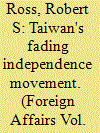

|
|
|
|
|
|
|
|